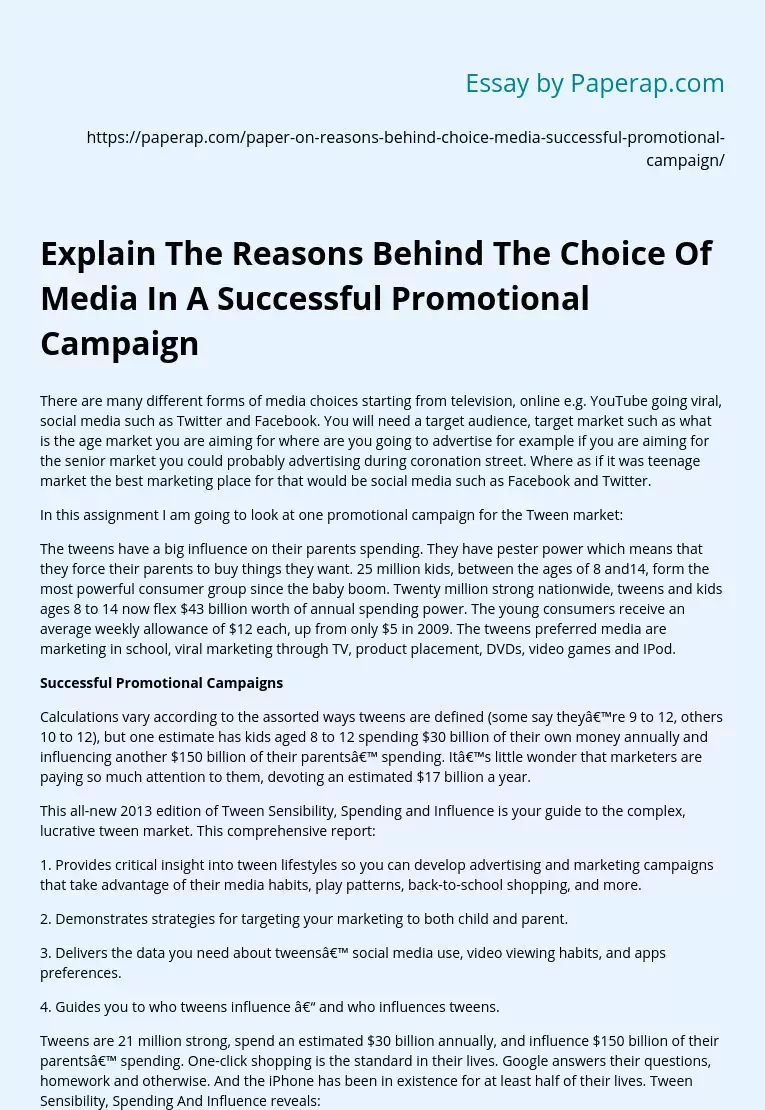Media Choice for Promotional Success
There are many different forms of media choices starting from television, online e.g. YouTube going viral, social media such as Twitter and Facebook. You will need a target audience, target market such as what is the age market you are aiming for where are you going to advertise for example if you are aiming for the senior market you could probably advertising during coronation street. Where as if it was teenage market the best marketing place for that would be social media such as Facebook and Twitter.
In this assignment I am going to look at one promotional campaign for the Tween market:
The tweens have a big influence on their parents spending. They have pester power which means that they force their parents to buy things they want. 25 million kids, between the ages of 8 and14, form the most powerful consumer group since the baby boom. Twenty million strong nationwide, tweens and kids ages 8 to 14 now flex $43 billion worth of annual spending power.
The young consumers receive an average weekly allowance of $12 each, up from only $5 in 2009. The tweens preferred media are marketing in school, viral marketing through TV, product placement, DVDs, video games and IPod.
Successful Promotional Campaigns
Calculations vary according to the assorted ways tweens are defined (some say they’re 9 to 12, others 10 to 12), but one estimate has kids aged 8 to 12 spending $30 billion of their own money annually and influencing another $150 billion of their parents’ spending. It’s little wonder that marketers are paying so much attention to them, devoting an estimated $17 billion a year.
This all-new 2013 edition of Tween Sensibility, Spending and Influence is your guide to the complex, lucrative tween market. This comprehensive report:
1. Provides critical insight into tween lifestyles so you can develop advertising and marketing campaigns that take advantage of their media habits, play patterns, back-to-school shopping, and more.
2. Demonstrates strategies for targeting your marketing to both child and parent.
3. Delivers the data you need about tweens’ social media use, video viewing habits, and apps preferences.
4. Guides you to who tweens influence – and who influences tweens.
Tweens are 21 million strong, spend an estimated $30 billion annually, and influence $150 billion of their parents’ spending. One-click shopping is the standard in their lives. Google answers their questions, homework and otherwise. And the iPhone has been in existence for at least half of their lives. Tween Sensibility, Spending And Influence reveals:
1. How much spending money tweens have and how and where they spend it
2. When to address tweens as children and when to communicate with them in a more adult-like fashion
3. What tweens do with their time, online and off?
I have decided to Disneyland as a service for the tween market;
Disneyland:
Disney Channel, the leader in television for kids and families, launches a branding campaign highlighting the network’s original programming. Targeted to U.S. “tweens,” a key demographic made up of kids ages nine to fourteen, the $10 million-plus campaign launches at the end of August, and will initially be supported through two 30-second television spots.
This campaign is designed to inform kids that Disney Channel is a destination for tween-oriented original programming. We want the take-away for tweens to be that Disney Channel is the place to go for unexpected original entertainment,” said Eleo Hensleigh, executive vice president, marketing, Disney/ABC Cable Networks.
Kids 9-14 will appreciate the humor of the spots, each with an unexpected “twist.” In the first spot, “Gotta Go,” a 14 year-old boy urgently runs home just in time…to watch Disney Channel. In the second spot, “Scare,” three kids escape the horror of their house and run next door just in time…to find a TV that’s working so they can keep watching Disney Channel. The spots will run on a variety of broadcast and cable networks.
Teenagers are more worried how they look and how much money they have. They would use social media such as Facebook and Twitter. They would attract teenagers by social media. Disney would use different media such as TV or Internet and Viral marketing because they know that the tweens will watch TV some point of the day. They would use product placement so that when tweens watch a programme or a film there will be product placement in it. They will also market in school so that the tweens are more aware of their products.
Disney theme parks, including the water parks, are fun for family members of all ages, and many of the rides and attractions appeal to teenage tastes. Older teens can explore Disney’s parks on their own, especially if the family is staying at an on-site hotel. At Walt Disney World in Orlando, they can move between multiple theme parks with a Park Hopper ticket and use Disney’s free internal transportation system to meet up with the rest of the family at a park or restaurant or head back to the hotel.
Media Choice for Promotional Success. (2019, Dec 05). Retrieved from https://paperap.com/paper-on-reasons-behind-choice-media-successful-promotional-campaign/

